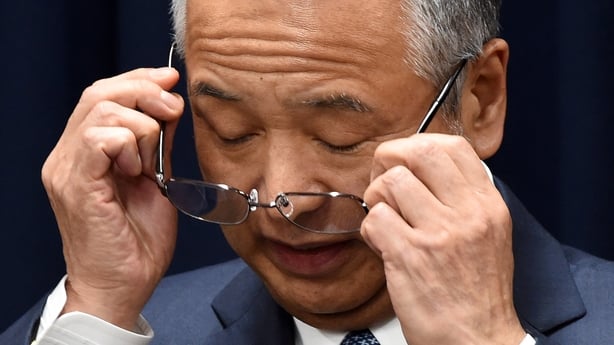Japanese Economy Minister Akira Amari resigned abruptly today to take responsibility for a political funding scandal that rocked the government, but denied having taken bribes.
Amari's quitting, who has spear-headed Prime Minister Shinzo Abe's economic policies, could pose a setback to the administration's "Abenomics" growth plan aimed at driving Japan out of deflation, analysts said.
But the government moved swiftly to contain the fallout by appointing Nobuteru Ishihara, a former minister and secretary-general of the ruling Liberal Democratic Party, as his replacement.
In a packed news conference televised live, Amari acknowledged taking money from a construction company executive but said he told his aides to correctly record the funds as a political donation.
While asserting his legal innocence, Amari said he was stepping down to prevent the scandal from being a distraction to the Abe administration's drive to pull the country out of deflation.
"Japan is finally emerging from deflation," he said. "We need to pass legislation through parliament for steps to beat deflation and create a strong economy as soon as possible," he added.
"Anything that hampers this must be eliminated, and I'm no exception. I, therefore, would like to resign as minister to take responsibility" for what he said his aides had done.

Part of the money has gone missing because of mishaps by his secretaries, Amari said, but two of them have resigned and he must take responsibility as their supervisor.
Just hours before the news conference, Amari had said he would fulfil his duties as minister "with utmost effort".
Amari is a close ally of the prime minister and a core member of his policy team. He led Japan's negotiations for the Trans-Pacific Partnership free trade bloc.
Last week, Japanese magazine Shukan Bunshun published an article accusing Amari and his aides of accepting money from an unnamed construction company in exchange for helping that firm receive government compensation for disputes over land ownership and waste removal at a public works site.
Less than 90 minutes after Amari announced his resignation, Prime Minister Abe named Ishihara as his replacement and stressed that reforms would continue.
"Abenomics is at a critical juncture. I'd like him to use his full capacity to pull Japan out of deflation and put its economy on a growth path," Abe said.
The accusations on bribery come at a sensitive time because policy makers are already grappling with a stock market sell-off, a rising yen and worries about a weakening global economy.

